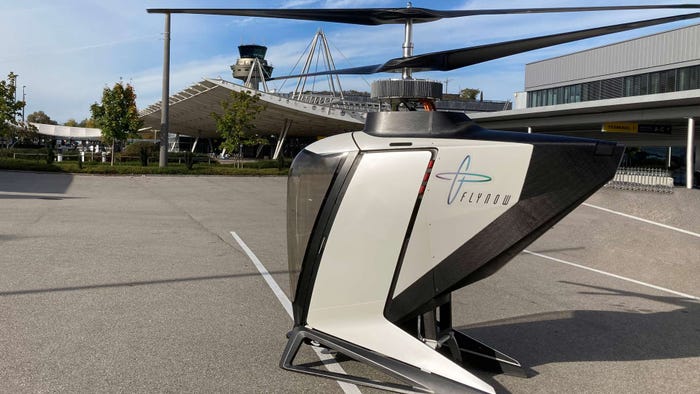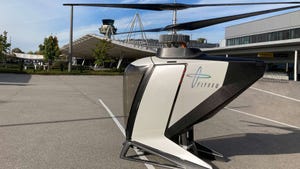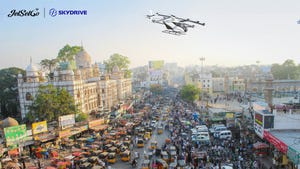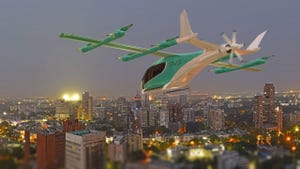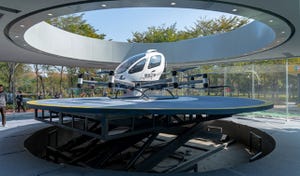Most Read: Flying Taxi Developer Plans Service in India; Parking Valet Robots Could Roll Out Worldwide in $24M DealMost Read: Flying Taxi Developer Plans Service in India; Parking Valet Robots Could Roll Out Worldwide in $24M Deal
Also inside, military-grade encryption broken by quantum computer, gas-sniffing DroneDog provides security at Indianapolis 500 and more
Here are the most-read stories on IoT World Today this week.
Flying Taxi Developer Plans Service in India
An air taxi developer in India is partnering to create India’s first eVTOL (electric vertical takeoff and landing) equipped airport.
Sarla Aviation has teamed with Bangalore International Airport to establish facilities for air taxi services at Bengaluru International Airport, one of the largest airports in India.
Sarla Aviation is developing an electric aerial vehicle (EAV) to carry a pilot, six passengers and luggage.
"I am proud to partner with Kempegowda International Airport, marking a significant step in addressing Bengaluru’s congestion challenges,” said Adrian Schmidt, CEO and co-founder. “Currently, a journey from Indiranagar to the airport can take 1.5 hours.
Find out about the new airport
Parking Valet Robots Could Roll Out Worldwide in $24M Deal
Autonomous parking bots are set to become a more familiar sight in future, following the acquisition of French company Stanley Robotics.
Seoul-based HL Robotics, which is a subsidiary of the industrial conglomerate HL Holdings, is set to take a significant 74.1% stake in the French firm, with South Korea media reporting that it has paid nearly $24 million to do so.
It is understood the deal will be completed in December, with the remaining shares held by the founders of Stanley Robotics, who will continue to manage the company.
HL Robotics has wasted no time in announcing its intention to accelerate the rollout of Stanley’s signature technology.
Watch the parking valet robots in action
Military-Grade Encryption Broken by Quantum Computer
Chinese researchers have said they have made significant inroads in using a current quantum computer to break encryption algorithms used in banking and defense.
A team led by Wang Chao from Shanghai University used a D-Wave Advantage quantum computer to attack encryption algorithms such as Present, Gift-64 and Rectangle.
These algorithms are part of the Substitution-Permutation Network (SPN) structure, which is integral to widely used encryption methods like AES-256, which is considered one of the strongest standards and is used in fields including banking and cryptocurrency.
It is also used in military systems to secure satellite communication, radio communication, network and email security, voice over internet protocol and secure voice communication.
Gas-Sniffing DroneDog Provides Security at Indianapolis 500
Robotics security provider Asylon Robotics deployed a fleet — or pack, rather — of its gas-sniffing DroneDog 2 security robots at the Indianapolis 500 earlier this year.
The quadruped drones, built using the Boston Dynamics robot dog Spot platform, were equipped with InterceptIR remote chemical gas detectors from 908 Devices and powered by Asylon’s PupPack, a payload that includes a high-definition camera, thermal imaging, cellular connectivity and an Nvidia AI/ML processor.
The robots conducted autonomous patrols of the GPS-denied and communications-limited tunnels underneath the Indianapolis Motor Speedway using a secure, mesh communications network, augmented by Starlink, to transmit live video feeds and real-time chemical gas data back to an on-site emergency operations center via Asylon’s DroneIQ software. This capability helped provide situational awareness to emergency crews monitoring the event, which was attended by more than 300,000 spectators, whose personal devices saturated existing cell networks.
WeRide Reveals All-New Self-Driving Taxi; Most Spacious Yet
Chinese company WeRide has unveiled what it claims is the world’s most spacious self-driving taxi yet.
The reveal was strategically announced just days after Tesla showed off its own vision of a future robotaxi, generating plenty of attention – if not much in the way of credibility – for the world of autonomous vehicles.
And the new GXR shows just how far Elon Musk’s company is lagging behind the current self-driving taxi big players – a point not lost on the Guangzhou company, which is highlighting its experience in the field by promoting its new minivan as “leveraging over 1,800 days in operations.”
The self-driving taxi’s credentials are bolstered by the fact that it is based on a vehicle already on the market – the Supervan sold by Chinese brand Farizon, which is owned by Geely, the Guangzhou giant that also has Volvo and Polestar in its stable. Among the Supervan’s highlights are innovative steer-by-wire tech and a swappable large capacity battery pack.
About the Author
You May Also Like


.jpg?width=700&auto=webp&quality=80&disable=upscale)
